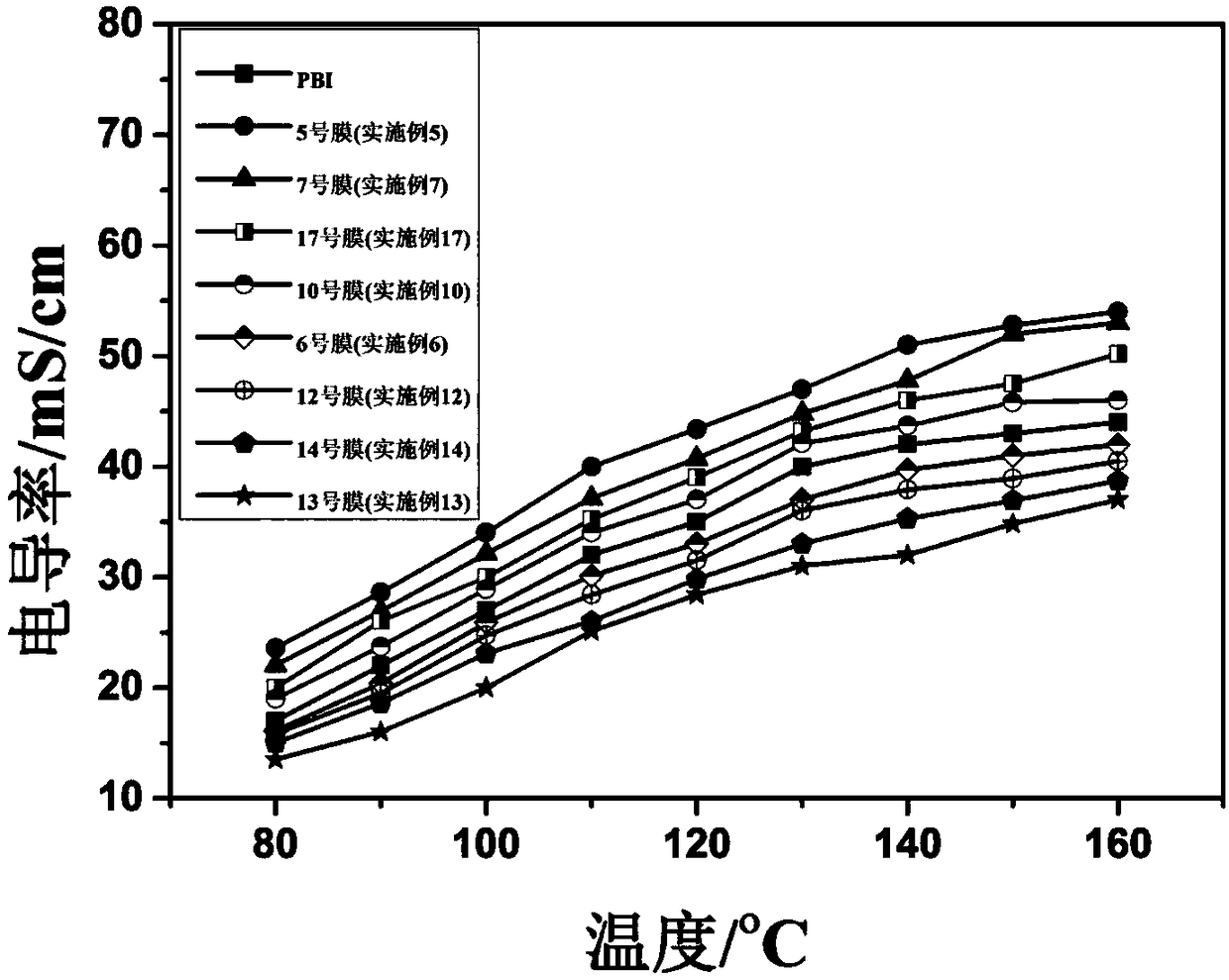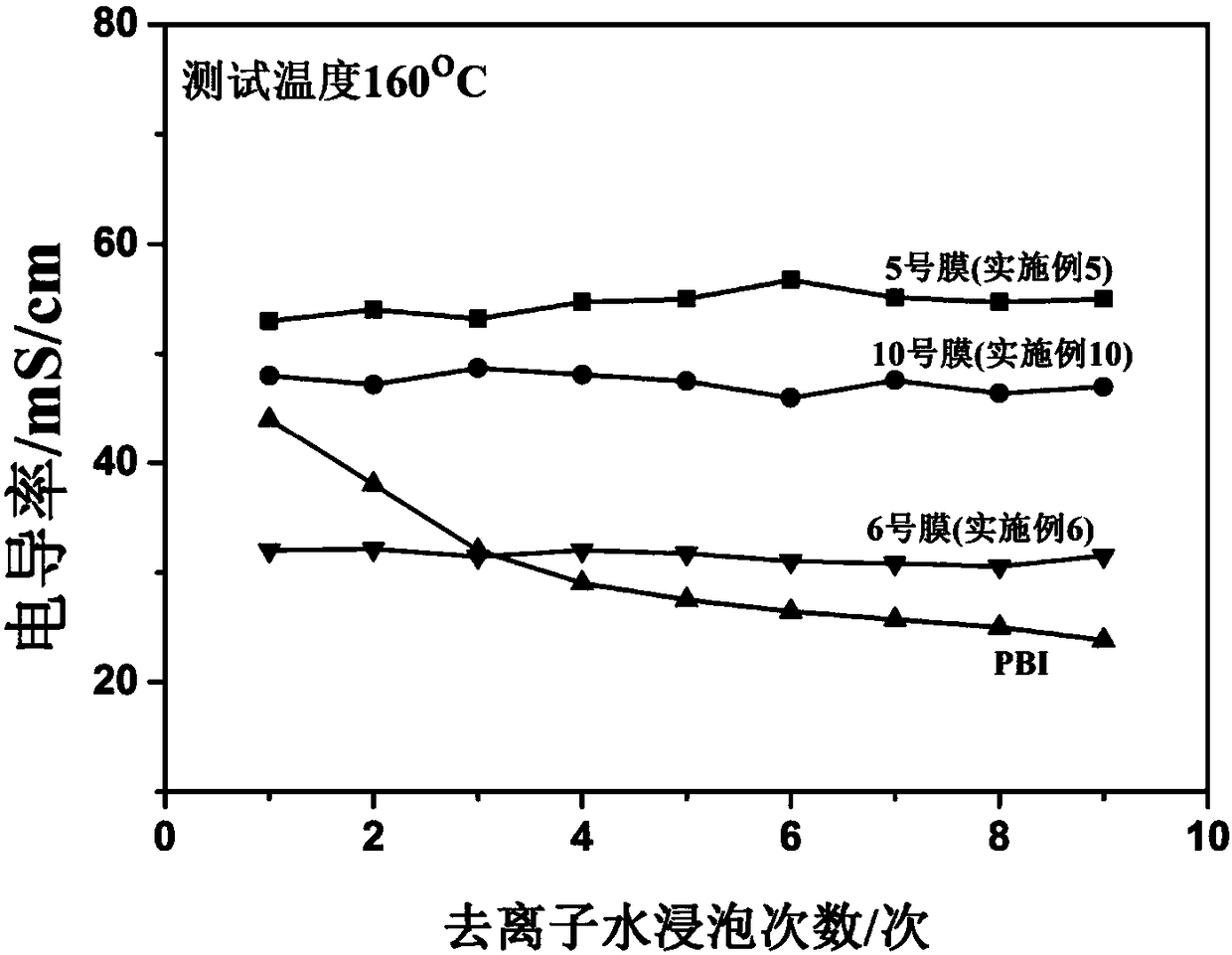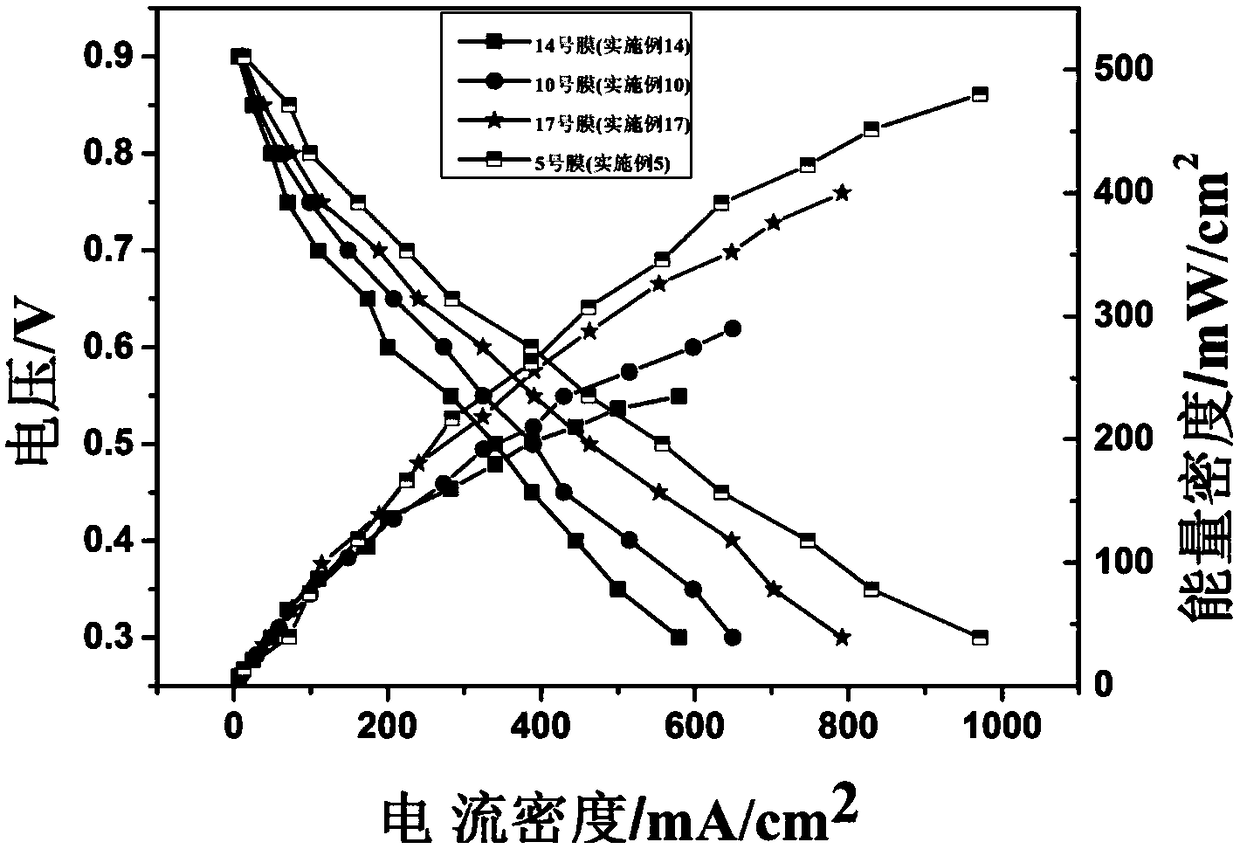Organic phosphonic acid high-temperature proton exchange membrane for fuel cell and preparation method thereof
A proton exchange membrane and organic phosphonic acid technology, which is applied in fuel cells, circuits, electrical components, etc., can solve the problems of mechanical strength decline, inorganic phosphoric acid loss, affecting membrane dimensional stability and service life, etc.
- Summary
- Abstract
- Description
- Claims
- Application Information
AI Technical Summary
Problems solved by technology
Method used
Image
Examples
Embodiment 1
[0070] OSO 2 -PBI and [3-(trimethylsilyloxymethyl)-1-vinyltriazole-allyl phosphonic acid bis(triethylsilyl)] copolymer B 1 and organic polymer crosslinking agent C 1 Preparation of composite membrane
[0071]
[0072] (1) 3-(trimethylsiloxymethyl)-1-vinyltriazole-allylphosphonic acid bis(triethylsilyl)ester] copolymer B 1 (molar ratio 1:10) preparation
[0073] Under the protection of nitrogen, 3-(trimethylsiloxymethyl)-1-vinyltriazole (197.1mg, 1mmol) and allylphosphonic acid bis(triethylsilane) were successively added into the three-necked reaction flask ) ester (3501.9mg, 10mmol), deionized water (250mL) was used as solvent, and then a free radical chain initiator azobisisobutyronitrile (AIBN, 18.1mg, 0.11mmol) was added. Stir (mechanical stirring) and heat to 80°C for reaction. After reacting for 24h, the solution became viscous, the reaction was stopped, and it was cooled to room temperature. Pour the reaction solution into ethyl acetate, and keep stirring, solid...
Embodiment 2
[0077] f 6 -PBI and [2-(trimethylsilyloxymethyl)-1-vinylimidazole-vinylphosphonic acid bis(trimethylsilyl) ester] copolymer B 2 and organic polymer crosslinking agent C 2 Preparation of composite membrane
[0078]
[0079] (1) 2-(Trimethylsilyloxymethyl)-1-vinylimidazole-vinylphosphonic acid bis(trimethylsilyl) copolymer B 2 (molar ratio 1:8) preparation
[0080] Under nitrogen protection, 2-(trimethylsiloxymethyl)-1-vinylimidazole (196.1 mg, 1 mmol) and vinylphosphonic acid bis(trimethylsilyl) ester ( 2016.7mg, 8mmol), with deionized water (200mL) as the solvent, and then adding the radical chain initiator azobisisobutyronitrile (AIBN, 14.8mg, 0.09mmol). Stir (mechanical stirring) and heat to 80°C for reaction. After reacting for 24h, the solution became viscous, the reaction was stopped, and it was cooled to room temperature. Pour the reaction solution into ethyl acetate, and keep stirring, solids are precipitated, filtered, and vacuum-dried to obtain copolymer B 2...
Embodiment 3
[0084] Poly[2,6-[4′,4″-(diphenylmethane)]-benzodiimidazole] and [(5-vinyltriazole-1-)methanol—1,1-vinyldi Phosphonic acid] copolymer B 3 and organic polymer crosslinking agent C 3 Preparation of composite membrane
[0085]
[0086] (1) (5-vinyltriazole-1-)methanol-1,1-vinyl diphosphonic acid copolymer B 3 (molar ratio 1:6) preparation
[0087] Under nitrogen protection, (5-vinyltriazole-1-)methanol (125.1mg, 1mmol) and 1,1-vinyldiphosphonic acid (1127.9mg, 6mmol) were successively added to a three-necked reaction flask to remove Ionized water (200 mL) was used as a solvent, and then a free radical chain initiator, azobisisobutyronitrile (AIBN, 8.2 mg, 0.05 mmol), was added. Stir (mechanical stirring) and heat to 80°C for reaction. After reacting for 24h, the solution became viscous, the reaction was stopped, and it was cooled to room temperature. Pour the reaction solution into ethyl acetate, and keep stirring, solids are precipitated, filtered, and vacuum-dried to ob...
PUM
| Property | Measurement | Unit |
|---|---|---|
| Thickness | aaaaa | aaaaa |
| Glass transition temperature | aaaaa | aaaaa |
| Tensile strength | aaaaa | aaaaa |
Abstract
Description
Claims
Application Information
 Login to View More
Login to View More - R&D
- Intellectual Property
- Life Sciences
- Materials
- Tech Scout
- Unparalleled Data Quality
- Higher Quality Content
- 60% Fewer Hallucinations
Browse by: Latest US Patents, China's latest patents, Technical Efficacy Thesaurus, Application Domain, Technology Topic, Popular Technical Reports.
© 2025 PatSnap. All rights reserved.Legal|Privacy policy|Modern Slavery Act Transparency Statement|Sitemap|About US| Contact US: help@patsnap.com



